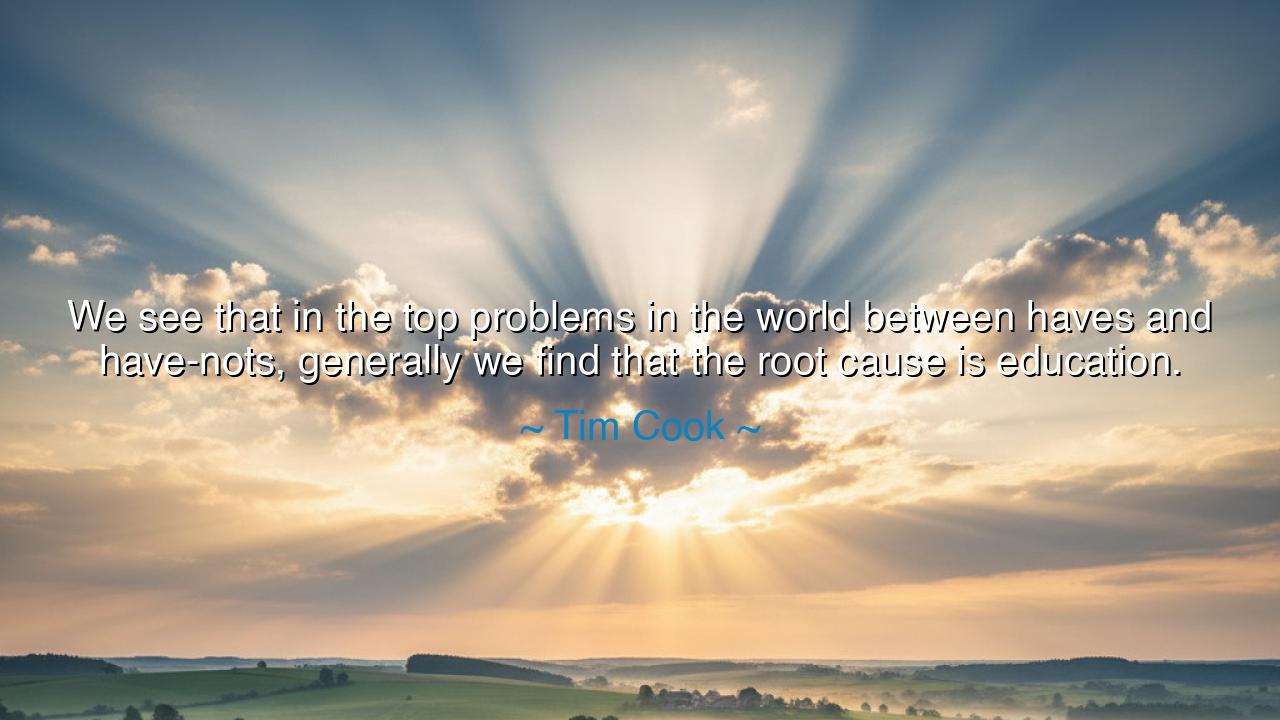
We see that in the top problems in the world between haves and
We see that in the top problems in the world between haves and have-nots, generally we find that the root cause is education.






When Tim Cook, the quiet yet resolute steward of Apple’s modern age, said, “We see that in the top problems in the world between haves and have-nots, generally we find that the root cause is education,” he was not speaking merely as a businessman, but as a philosopher of progress. Beneath his calm tone lies a truth as ancient as civilization itself — that education is the great divider and the great healer, the force that can both build empires and dissolve them. His words are not about wealth alone, but about understanding, for every inequality in the world — of fortune, of opportunity, of freedom — can be traced to the uneven light of knowledge that falls upon humanity.
From the dawn of history, the haves and have-nots have been defined not simply by gold or power, but by access to learning. In the courts of Egypt, only the scribes could read the language of the gods; in the Middle Ages, only the clergy could unlock the secrets of scripture. Thus, ignorance became the chain that held the masses bound, and education the sword that could set them free. What Cook names as the “root cause” is not new — it is the same wound that humanity has carried for millennia: that light is not shared equally, and wherever it fails to shine, darkness grows in its place.
His insight is sharpened by his experience as a leader in the digital age, where technology has become the new temple of knowledge. Yet even in this age of instant information, the divide persists. The digital divide, the separation between those who can access, understand, and use technology and those who cannot, mirrors the ancient rift between scholar and servant. Cook, who has seen both the power and peril of this transformation, knows that without education — not just literacy, but the education of empowerment — technology becomes another mirror reflecting inequality rather than dissolving it. For without understanding, even the greatest tools are powerless in untrained hands.
History gives us countless examples of how education heals and uplifts. When Japan, after the devastation of World War II, lay in ruins, it did not rise through conquest or wealth, but through learning. The nation poured its heart into rebuilding its schools, teaching its children to think, to innovate, to create. Within decades, Japan transformed from ashes into one of the most advanced societies on earth. This rebirth did not come from resources or power, but from knowledge shared widely and deeply — the very cure that Cook prescribes for the divisions of our time.
Yet the inverse is equally true. When education is neglected, nations decay from within. The fall of great empires — Rome, the Ottomans, even the colonial powers — did not come solely from outside enemies, but from the erosion of wisdom within. When the people cease to learn, they cease to question; when they cease to question, they cease to grow. In this way, ignorance becomes a quiet tyrant — not ruling by force, but by indifference. Cook’s warning, though gentle, carries the weight of prophecy: if we do not mend the rift through education, the gap between haves and have-nots will widen until it consumes the world itself.
And yet, there is hope in his words — the kind of hope born from responsibility. For if the root of inequality lies in education, then the remedy is within our reach. Education is not a privilege to be hoarded, but a flame to be passed. It begins in classrooms, yes, but also in homes, communities, and the simple act of mentorship. Each generation has the sacred duty to leave the next one wiser, more curious, and more capable. When we teach, we do not merely transfer information — we ignite the divine fire of potential in another human being.
The lesson of Cook’s words is thus both practical and eternal: to heal the world, teach it. Give not only bread, but the knowledge to earn it. Build not only schools, but minds that can dream beyond their walls. Empower the young not just with facts, but with understanding — the courage to think freely and the humility to keep learning. For in the end, every bridge between the rich and the poor, the powerful and the powerless, begins with the same foundation: the classroom, the mentor, the open book.
Let us, then, take this as our vow — that the future shall not be divided by what one owns, but by what one understands. For as long as education remains the heart of our compassion and the core of our ambition, the world may yet see the day when the haves and have-nots become one — not in wealth, but in wisdom. And when that day comes, humanity will stand not as scattered nations, but as a single people illuminated by the same enduring light: the light of knowledge.






AAdministratorAdministrator
Welcome, honored guests. Please leave a comment, we will respond soon